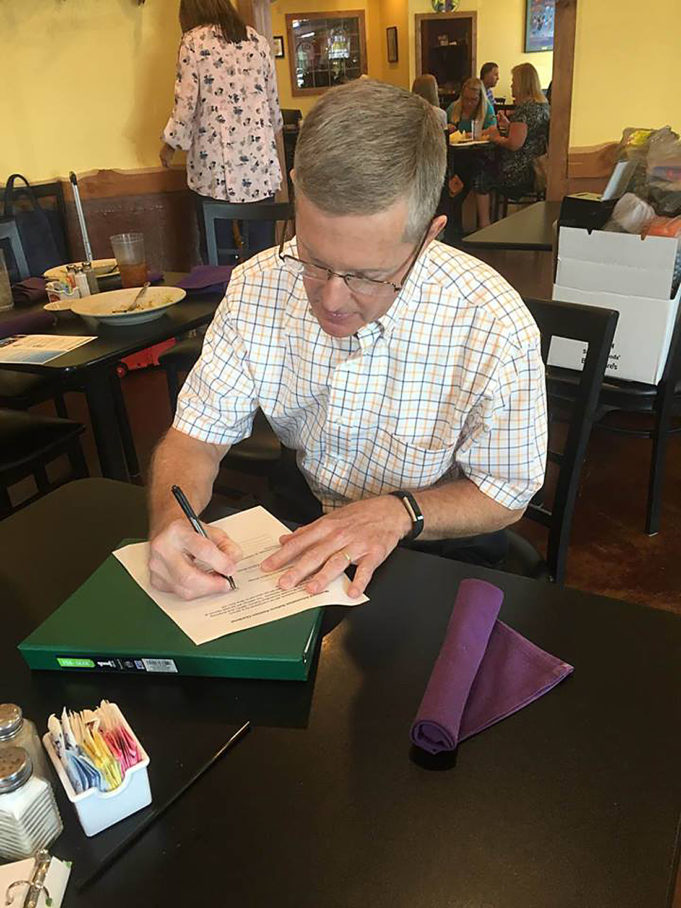Only a week after staving off efforts by Weatherford city officials to annex her small rural community, Zion Hill resident Courtney Butler is on a new mission. She and dozens of volunteers are trying to collect signatures from 10 percent of Parker County’s registered voters with the goal of ending involuntary annexation.
“We are getting signatures by placing our petition in binders in various businesses that requested them, contacting family and neighbors, and hosting booths at various community events,” Butler said.
If successful, Parker County will be first to take advantage of an annexation reform law that passed during the recent state legislative special session.
Located 20 minutes west of Fort Worth and just north of Weatherford, her 1,300-acre rural community is home to around 50 families. Many of her neighbors work in or regularly visit Fort Worth, but the sprawling, pastoral land offers a welcome reprieve from the bustle of city life. Cattle, chickens, and other livestock are a common sight in Zion Hill, and hunting and fishing are popular pastimes. Though sparsely populated, the community is “tight-knit,” Butler said.
“Our kids can play outside without us worrying for their safety,” she said. “Our neighbors are friends, and we watch each other’s homes. Living in Zion Hill is everything we wished for.”
Living in unincorporated Parker County has many advantages, she added, including fewer zoning and permit requirements than in nearby Weatherford. But that simple way of life was thrown into jeopardy on August 11. That’s when Zion Hill residents received letters from Weatherford city manager Sharon Hill, who said Weatherford was taking actions to annex Zion Hill.
Unbeknownst to Butler and her neighbors, Zion Hill was part of Weatherford’s master Thoroughfare Plan, which projects city transportation and infrastructure needs several years out. Largely via social media, Zion Hill residents quickly organized and began attending Weatherford city council meetings.
In a coincidence of timing, State Rep. Phil King, whose district covers parts of Parker and Wise counties, was spearheading annexation reform in Austin. During the state legislature’s special session, King was able to pass SB 6 (not to be confused with the controversial “bathroom bill” of the same abbreviation which died in the preceding regular session).
This SB 6, which was signed by Gov. Greg Abbott on August 15, divides Texas counties into two tiers: Tier 1 (total population fewer than 500,000) and Tier 2 (total population greater than 500,000). Residents in Tier 2 counties are protected from involuntary annexation, while residents in smaller counties are still subject to it. King added an amendment to the bill that allows Tier 1 counties, such as Parker County, to gain Tier 2 status if 10 percent of registered voters within the county sign a petition.
Annexation “has become a much more prominent issue in recent years, particularly in Parker County, where we’ve had so much growth,” King said in a phone interview.
With vocal opposition from Zion Hill residents and the passage of SB 6, Weatherford city council dropped its plans to annex Zion Hill. But many in the small community believe Weatherford officials will try again if given the chance. Weatherford city councilmember Kevin Cleveland said the proposed annexation was not a land grab but an effort to plan for the future.
“The thought process of annexation is to protect those thoroughfare corridors as well as water infrastructure,” he said in a phone interview. “We as a city have been very forward-thinking. We’ve been thinking of areas we want to be in. As far as how well communication has gone, I think a lot has been learned from both citizens and staff.”
Zion Hill residents are working to incorporate, following similar efforts by nearby communities Brock, Dennis, and Peaster. There may be unforeseen challenges, however. Once incorporated, cities are responsible for raising revenues for basic services like water, roads, and fire departments.
“I think it’s great everybody is pausing on the city side to figure out the best way forward,” Cleveland said. “I would not want people to make decisions based on fear, though. Sometimes, people will join up as a group to protect themselves from taxes and other responsibilities, not realizing that they are creating the same responsibility on a smaller scale” when they take on the responsibilities of running a city.
With the passage of SB 6, Cleveland said, major cities, including Fort Worth, will have to reconsider how to approach growth and annexation in the future.
King said there are times when annexation is appropriate, but it needs to be a “negotiated deal.”
There’s one key thing to remember, he said: “Citizens have rights. Cities don’t. Citizens have property rights. Cities don’t. The earliest documents in our nation’s founding talked about property rights.”
Butler and husband Steven Butler continue to invest in their property and community. The couple is planning to build a barn in the near future. They find joy in small projects and chatting with neighbors. Butler said there’s a small, old cemetery near their home. After the recent effort to save Zion Hill, she has thought a lot about what these plots of land mean to her and her family.
“Although our deceased family members have all been buried in other cemeteries, we often joke that we don’t know that we can leave Zion Hill, even in the afterlife,” she said. “We might just spend eternity here.”













Need to come do a story on what is going on in Mineral Wells. We had more citizens vote Nov 7th, than turned out to vote for the Presidential election. The Citizens are getting tired of the city wanting more $ and nothing to show for it. Has anyone seen the conditions of the streets in MW? Bonds have been passed before, with not much improvement and no $ trail from the Mayor and City Manager of 20+ years 🙁